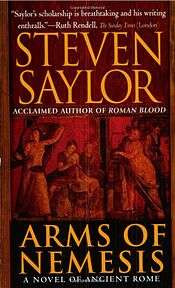Arms of Nemesis
 | |
| Author | Steven Saylor |
|---|---|
| Country | United States |
| Language | English |
| Series | Roma Sub Rosa |
| Genre | Historical novel |
| Publisher | St. Martin's Press |
Publication date | 1992 |
| Media type | Print (Hardback & Paperback) |
| Pages | 305 pp |
| ISBN | 978-0312081355 |
| Preceded by | Roman Blood |
| Followed by | Catilina's Riddle |
Arms of Nemesis is a historical novel by American author Steven Saylor, first published by St. Martin's Press in 1992. It is the second book in his Roma Sub Rosa series of mystery novels set in the final decades of the Roman Republic. The main character is the Roman sleuth Gordianus the Finder.[1][2][3][4][5][6]
Plot summary
The year is 72 BC, and the rebel gladiator Spartacus ravages the countryside of Italy, and threatens Rome itself.
Gordianus the Finder is rousted out of bed in the middle of the night by a new client: Marcus Mummius, an ex-centurion and the military advisor to Marcus Licinius Crassus, the richest man in Rome. Mummius demands that Gordianus accompany him on a trireme to the Bay of Pueteoli that very night, and is unfazed by Gordianus's demand for an unusually extravagant fee.
At a villa near Naples the master has been murdered, apparently by two disappeared slaves. One of the runaways wrote "Sparta" on the floor in the dead man's blood, which many take to believe part of "Spartacus", thus indicating they are partisans of the rebel. Crassus has been campaigning to be given command of an army to crush the rebellion; the murder of a relative by a slave, in Crassus' own villa, would normally be an embarrassment, but Crassus has decided to turn the event to his own advantage. By ancient Roman law, all the slaves in a household where one has committed murder shall be executed. Crassus has planned a grand arena spectacle in three days time, where all ninety-nine will be killed, in order to avenge his kinsman's murder and show the public that he is the right man to defeat Spartacus.
Major Themes
As with the previous novel, Roman Blood, the novel is dominated by a historical figure and his role in the politics of the latter Roman Republic. Arms focuses on Crassus, portraying him as ruthless and capable, but flawed by his thirst for glory. In spite of being fabulously wealthy, Crassus first rose to prominence as a military supporter of the dictator Sulla, and resents being famed primarily as a moneygrubber. He is particularly jealous of Pompey, and is anxious to secure the command against Spartacus before Pompey, the favored candidate for the command, returns from Spain.
In his afterword, Saylor writes that this thirst for glory would later lead to Crassus' death, and his subsequent condemnation by historians. Crassus died in the disastrous Battle of Carrhae, pursuing a self-financed campaign against the Parthian Empire, for no apparent reason except to compete with Pompey's military reputation.
In his subsequent novel, A Murder On The Appian Way, Gordianus explains to his daughter that Crassus' death dissolved the First Triumvirate between himself, Pompey, and Julius Caesar, exacerbating the rivalry between the remaining two and precipitating the events that led to the Roman Civil War.
References
- ↑ "Arms of Nemesis". goodreads.com. Retrieved 6 December 2013.
- ↑ "Arms of Nemesis: A Novel of Ancient Rome (Novels of Ancient Rome)". amazon.com. Retrieved 6 December 2013.
- ↑ "Arms of Nemesis". macmillan.com. Retrieved 6 December 2013.
- ↑ "Arms of Nemesis (Roma Sub Rosa Series #2)". barnesandnoble.com. Retrieved 6 December 2013.
- ↑ Arms of Nemesis: A Novel of Ancient Rome. booksgoogle.com.np. Retrieved 6 December 2013.
- ↑ "Review of Arms of Nemesis by Steven Saylor". yahoo.com. Retrieved 6 December 2013.